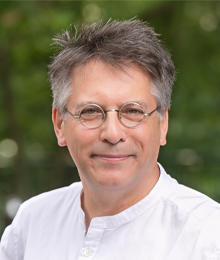An interview with Professor Graham Hatfull
October 2020
Graham Hatfull is Professor of Biological Sciences at the University of Pittsburgh, USA, and is a member of the Microbiology Society and was awarded the 2020 Peter Wildy Prize, and he is a Fellow of the American Society for Microbiology. In this interview, he tells us about his research into bacteriophages and roles in science, science education, and medicine.

Tell us about your research.
We have been studying numerous aspects of bacteriophage biology and applications since I joined the University of Pittsburgh in 1988, after training at the University of London, Edinburgh University, and at the MRC Laboratory of Molecular Biology in Cambridge. We have focused on phages that infect mycobacteria, with a view to not only exploring the diversity, dynamics, and evolution of the phage population, but exploiting them to develop tools for mycobacterial genetics and potential clinical applications. We have developed integrated research education programs contributing to a collection of over 17,000 phages, described tools used widely in the genetics of Mycobacterium tuberculosis and reported the first successful therapeutic use of phages to treat a mycobacterial infection.
What is your role in this research?
As a Professor at a large university, I teach undergraduates and graduate students, and I lead a research group of about 15 –20 people that includes student researchers (undergraduate and graduate), postdoctoral researchers, and research assistants. I direct this research initiative, mentor lab members, obtain funding to support the research, and help write articles and reviews.
Why is this research important?
Bacteriophages are the most numerous biological entities in the biosphere! And yet we know relatively little about most of them. They are enormously diverse genetically and the vast majority of their genes are of unknown function. So, they harbor many of nature’s secrets that have yet to be solved. Phages – and the dynamic interactions with their hosts – have given us powerful biotechnological tools such as restriction enzymes and CRISPR-Cas. Finally, phages have therapeutic potential for treating antibiotic resistant bacterial infections, an urgent clinical need.
Why are professional organisations such as the Microbiology Society important?
I am a member of both the Microbiology Society and the American Society for Microbiology. These play critical roles in organizing, representing, and supporting the communities of academic and clinical microbiologists within the UK and the US, respectively. They help the general public to understand what microbiologists do and why it is important, and they provide opportunities for microbiologists to share their research and their educational strategies with each other.
Please tell us about your educational initiatives in microbiology.
We have developed several programs aimed at providing opportunities for students to become engaged in authentic scientific research; not just available to students identified as ‘gifted’, but to all students regardless of academic background. These programs are based on a common platform in which students (mostly first-year undergraduates) isolate a new bacteriophage, name it, purify it, isolate DNA, and computationally analyze its sequenced genome. The largest program is the Science Education Alliance Phage Hunters Advancing Genomics and Evolutionary Science (SEA-PHAGES) program, with almost 150 participating institutions and over 5,000 student researchers each year. Phage discovery and genomics is well-suited for these purposes, with an endless and highly diverse phage population awaiting discovery using simple but powerful techniques and approaches.
Why does microbiology matter?
Microbes influence us and the world around us in profound ways, from the changing climate to human health. Microbes are so numerous and so varied that there is much to be discovered, and advances in technology provide new and powerful ways to study and exploit the microbial world.


